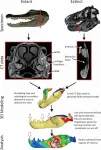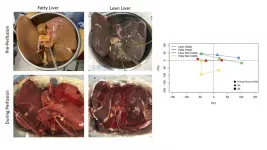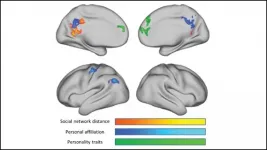(Press-News.org) During infection, SARS-CoV-2 binds to a cellular receptor known as angiotensin converting enzyme 2 (ACE2) before entering a cell and replicating. Because it is not well established whether common blood pressure medications can increase the levels of ACE2, there has been some concern that patients taking these medications might be more susceptible to COVID-19.
In a new study, researchers led by Hans Ackerman, MD, DPhil, in the Laboratory of Malaria and Vector Research (LMVR) at the National Institute of Allergy and Infectious Diseases, found that mice treated with an ACE inhibitor blood pressure medication showed increased levels of ACE2. However, mice that received both an ACE inhibitor and a different blood pressure medicine known as an angiotensin receptor blocker (ARB) did not exhibit the increase.
"Based on these findings, we recommend that researchers analyze existing and ongoing clinical studies to determine whether people on ACE inhibitor-ARB combination therapy show different COVID-19 susceptibility, complications and outcomes than patients taking only an ACE inhibitor or ARB medication," said Steven Brooks, PhD, a post-doctoral research fellow in the Ackerman laboratory.
Aline da Silva Moreira, PhD, a post-doctoral research fellow in the Ackerman laboratory, will present the new research at the END
Could heart medications increase COVID-19 risk?
Mouse study takes tissue-specific look at how blood pressure medications affect SARS-CoV-2 receptors
2021-04-26
ELSE PRESS RELEASES FROM THIS DATE:
How did dinosaurs deliver bone-crushing bites? By keeping a stiff lower jaw.
2021-04-26
Tyrannosaurus rex dinosaurs chomped through bone by keeping a joint in their lower jaw steady like an alligator, rather than flexible like a snake, according to a study being presented at the END ...
Researchers work to increase number of transplantable livers
2021-04-26
Thousands of livers donated for transplantation are discarded or turned down every year due to concerns about organ quality and function. New insights into why these organs are considered unusable and how they function during external perfusion could help save lives by greatly increasing the number of livers that are transplantable.
After a liver is removed from a donor's body, it undergoes a process known as perfusion which flows blood or a blood replacement though the organ's blood vessels to keep them open and active before the transplantation surgery.
"Our new findings will allow us to design therapies that could be used during external perfusion to improve the quality of organs so that these livers can be transplanted instead of being discarded," ...
Taking vitamin D could lower heart disease risk for people with dark skin
2021-04-26
New research suggests a simple step could help millions of people reduce their risk of heart disease: make sure to get enough vitamin D. Elucidating linkages between skin pigmentation, vitamin D and indicators of cardiovascular health, the new study, combined with evidence from previous research, suggests vitamin D deficiency could contribute to the high rate of heart disease among African Americans.
"More darkly-pigmented individuals may be at greater risk of vitamin D deficiency, particularly in areas of relatively low sun exposure or high seasonality of sun exposure," said S. Tony Wolf, PhD, a postdoctoral fellow at the Pennsylvania State University and the study's lead author. "These ...
How the brain encodes social network structure
2021-04-26
The brain encodes information about our relationships and the relationships between our friends using areas involved in spatial processing, according to new research published in JNeurosci.
Humans maintain hundreds of social relationships, requiring the brain to catalogue countless details about each person and their connections to other people. But it is not known how exactly the brain stores all of this information.
To uncover how the brain encodes social network structure, Peer et al. used Facebook data to map out participants' social connections. Then the researchers measured their brain activity with fMRI as they thought about people from their network. Thinking about a connection generated ...
Research result reporting set for boost under new system
2021-04-26
A new guideline for reporting research results has been developed to improve reproducibility, replication, and transparency in life sciences.
The new Research Materials, Design, Analysis and Reporting (MDAR) Framework will harmonise the recording of outcomes across several major journals, its developers say.
Existing guidelines address specific parts of biomedical research, such as ARRIVE - which relates to animal research - and CONSORT, associated with clinical trial reporting.
The MDAR Framework - developed by a team from the University of Edinburgh, the Centre for Open Science and six major journal publishers - complements these by establishing basic minimum reporting requirements and best practice recommendations.
The Framework ...
Spike in severe pediatric type 2 diabetes complication during COVID-19 pandemic
2021-04-26
According to the Centers for Disease Control and Prevention (CDC), children generally appear to be less severely impacted by COVID-19 than adults. But a new study from Children's Hospital Los Angeles shows that the pandemic could be affecting children's health in unexpected ways. The study reveals a surge of patients presenting with diabetic ketoacidosis, a severe complication of type 2 diabetes. Published today in Diabetes Care, these data offer additional insights into how the pandemic may be impacting the nation's children.
Diabetic ketoacidosis, or DKA, is life-threatening. "DKA happens when insulin levels in the blood drop too low for too long," says Lily Chao, MD, MS, ...
Supervisors focused on others' needs get 'benefit of the doubt' from employees
2021-04-26
Like beauty, fairness is in the eye of the beholder.
In the workplace, whether or not we believe that a supervisor has treated us fairly depends on a number of factors, including motive, according to new research from the University of Notre Dame.
Employees evaluate the fairness of an interaction with an authority figure based on what researcher Cindy Muir (Zapata), associate professor of management at Notre Dame's Mendoza College of Business, describes as justice criteria or rules. These include relying on decision-making processes that grant employees voice and are consistent among employees, ethical and free of bias; treating team members with dignity, respect and ...
Mayo Clinic researchers question effectiveness of mRNA COVID-19 vaccines for solid organ transplant
2021-04-26
JACKSONVILLE, Fla. -- A small study from Mayo Clinic researchers raises the concern that some transplant patients may have a limited immune response after being vaccinated for COVID-19 with an mRNA vaccine. Their findings are published as a letter to the editor in the American Journal of Transplantation.
The letter covers seven organ transplant recipients diagnosed with COVID-19 at Mayo Clinic in Florida six to 44 days after receiving either of the mRNA COVID-19 vaccines that have been authorized for emergency use by the Food and Drug Administration. Two patients had received one dose, and five patients had received both doses.
COVID-19 infection was confirmed in all patients with a polymerase chain reaction nasal swab test. The study team, led by Hani Wadei, M.D., ...
Hydrocracking our way to recycling plastic waste
2021-04-26
Millions of tons of plastic end up in landfills every year. It's a big societal problem and an even larger environmental threat.
In the United States, less than 9% of plastic waste is recycled. Instead, more than 75% of plastics waste ends up in landfills and up to 16% is burned, a process that releases toxic gases into the atmosphere.
Researchers from the University of Delaware's Center for Plastics Innovation (CPI) have developed a direct method to convert single-use plastic waste -- plastic bags, yogurt containers, plastic bottles and bottle caps, packaging and more -- to ready-to-use molecules for jet fuels, diesel and lubricants.
The work, reported in a paper in Science ...
Asteroid that hit Botswana in 2018 likely came from Vesta
2021-04-26
April 23, 2021, Mountain View, CA -- An international team of researchers searched for pieces of a small asteroid tracked in space and then observed to impact Botswana on June 2, 2018. Guided by SETI Institute meteor astronomer Peter Jenniskens, they found 23 meteorites deep inside the Central Kalahari Game Reserve and now have published their findings online in the journal Meteoritics and Planetary Science.
"Combining the observations of the small asteroid in space with information gleaned from the meteorites shows it likely came from Vesta, second largest asteroid in our Solar System and target of NASA's ...
LAST 30 PRESS RELEASES:
Scientists show how to predict world’s deadly scorpion hotspots
ASU researchers to lead AAAS panel on water insecurity in the United States
ASU professor Anne Stone to present at AAAS Conference in Phoenix on ancient origins of modern disease
Proposals for exploring viruses and skin as the next experimental quantum frontiers share US$30,000 science award
ASU researchers showcase scalable tech solutions for older adults living alone with cognitive decline at AAAS 2026
Scientists identify smooth regional trends in fruit fly survival strategies
Antipathy toward snakes? Your parents likely talked you into that at an early age
Sylvester Cancer Tip Sheet for Feb. 2026
Online exposure to medical misinformation concentrated among older adults
Telehealth improves access to genetic services for adult survivors of childhood cancers
Outdated mortality benchmarks risk missing early signs of famine and delay recognizing mass starvation
Newly discovered bacterium converts carbon dioxide into chemicals using electricity
Flipping and reversing mini-proteins could improve disease treatment
Scientists reveal major hidden source of atmospheric nitrogen pollution in fragile lake basin
Biochar emerges as a powerful tool for soil carbon neutrality and climate mitigation
Tiny cell messengers show big promise for safer protein and gene delivery
AMS releases statement regarding the decision to rescind EPA’s 2009 Endangerment Finding
Parents’ alcohol and drug use influences their children’s consumption, research shows
Modular assembly of chiral nitrogen-bridged rings achieved by palladium-catalyzed diastereoselective and enantioselective cascade cyclization reactions
Promoting civic engagement
AMS Science Preview: Hurricane slowdown, school snow days
Deforestation in the Amazon raises the surface temperature by 3 °C during the dry season
Model more accurately maps the impact of frost on corn crops
How did humans develop sharp vision? Lab-grown retinas show likely answer
Sour grapes? Taste, experience of sour foods depends on individual consumer
At AAAS, professor Krystal Tsosie argues the future of science must be Indigenous-led
From the lab to the living room: Decoding Parkinson’s patients movements in the real world
Research advances in porous materials, as highlighted in the 2025 Nobel Prize in Chemistry
Sally C. Morton, executive vice president of ASU Knowledge Enterprise, presents a bold and practical framework for moving research from discovery to real-world impact
Biochemical parameters in patients with diabetic nephropathy versus individuals with diabetes alone, non-diabetic nephropathy, and healthy controls
[Press-News.org] Could heart medications increase COVID-19 risk?Mouse study takes tissue-specific look at how blood pressure medications affect SARS-CoV-2 receptors




